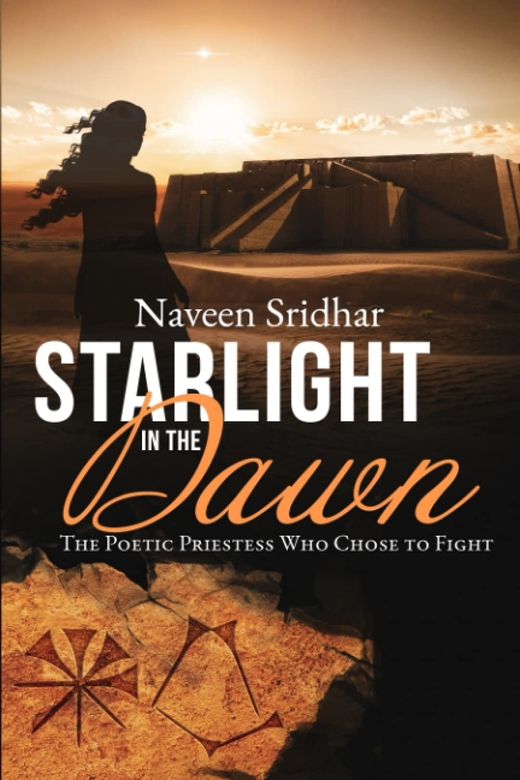
A thrilling and dramatic epic from one of the cradles of civilization, Starlight in the Dawn: The Poetic Priestess Who Chose to Fight by Naveen Sridhar is both majestic and accessible, an ambitious and symbolic novel that will transport readers in a deeply powerful way to the ancient past.
Enheduanna (Hedu) may be the daughter of a Mesopotamian emperor, but she is also an outspoken and bold protagonist, a fiery individual, and one who respects liberty and justice more than tradition. This belief draws her into righteous conflicts and divisive arguments, with everyone from laymen to kings. Whether training for battles of diplomacy or waxing poetic on patriarchal oppression and the religious devotions of a high priestess, Hedu is a font of knowledge, courage, independence and inspiration.
Readers of any age, gender, or culture will see the dauntless spark of greatness in this larger-than-life, yet oddly relatable heroine. Self-directed questions and unpredictable turns in the narration are continually compelling, lending the narrator a personality, and even some agency as the novel’s omniscient storyteller. Supported by a colorful secondary cast who are often given the spotlight for in-depth development, the story feels fully fleshed out and believable.
Beneath the somewhat simple-to-follow story is the real heart of this book – powerful thematic explorations of gender relations, power, charlatanism, corruption, love, and violence. While the exposition-heavy sections of prose can occasionally grow wearisome, the conversations and debates that pepper these pages are compelling and carefully worded. Some of the same discussions could be imagined around dinner tables today, or shouted about on the national news. Although the language may not be as direct or detailed as our modern parlance, there are strong opinions and controversial stances embraced by certain characters that feel prophetic, given this Sumerian setting.
The prose is slow and calculating, rarely rushing, and taking time to ensure that readers are keeping pace with the author’s intention. That being said, there is also a good deal of in-depth exposition, and some of the passages can be dense, filled with translated words, Sumerian names, foreign places, and high-level language. While not a critique, this novel does demand some effort on a reader’s part if they want to fully immerse and lose themselves in Sridhar’s remarkably detailed world, and some of the more convoluted prose feels as though something has been lost in translation, rather than intentionally restructured into a lyrical turn of phrase.
On balance, the novel is impressively well researched and realized, and linguists will appreciate the author’s obvious love for etymology and history. Fictional though the plot may be, this richly imagined past feels immediate and authentic, from the nuances of municipal government to traditions of the royal court and ancient geographical markers and centers of commerce. The writing is academic yet entertaining, capturing the big-picture essence of ancient epic poetry, but also weaving a story with thoroughly developed characters, measurable stakes, and an enjoyably straightforward plot.
All in all, the author’s balance of an immersive historical setting and characters wrestling with timeless existential struggles makes Starlight in the Dawn a stellar work of historical fiction.
Book Links
STAR RATING
Design
Content
Editing
Get an Editorial Review | Get Amazon Sales & Reviews | Get Edited | Get Beta Readers | Enter the SPR Book Awards | Other Marketing Services






















Leave A Comment